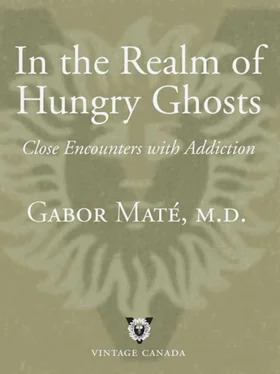A brain pre-set to be easily triggered into a stress response is likely to assign a high value to substances, activities and situations that provide short-term relief. It will have less interest in long-term consequences, just as people in extremes of thirst will greedily consume water knowing that it may contain toxins. On the other hand, situations or activities that for the average person are likely to bring satisfaction are undervalued because, in the addict’s life, they have not been rewarding—for example, intimate connections with family. This shrinking from normal experience is also an outcome of early trauma and stress, as summarized in a recent psychiatric review of child development:
Neglect and abuse during early life may cause bonding systems to develop abnormally and compromise capacity for rewarding interpersonal relationships and commitment to societal and cultural values later in life. Other means of stimulating reward pathways in the brain, such as drugs, sex, aggression, and intimidating others, could become relatively more attractive and less constrained by concern about violating trusting relationships. The ability to modify behavior based on negative experiences may be impaired. 30
Hardcore drug addicts, whose lives invariably began under conditions of severe stress, are all too readily triggered into a stress reaction. Not only does the stress response easily overwhelm the addict’s already challenged capacity for rational thought when emotionally aroused, but also the hormones of stress “cross-sensitize” with addictive substances. The more one is present, the more the other is craved. Addiction is a deeply ingrained response to stress, an attempt to cope with it through self-soothing. Maladaptive in the long term, it is highly effective in the short term.
Predictably, stress is a major cause of continued drug dependence. It increases opiate craving and use, enhances the reward efficacy of drugs and provokes relapse to drug-seeking and drug-taking. 31“Exposure to stress is the most powerful and reliable experimental manipulation used to induce reinstatement of alcohol or drug use,” one team of researchers reports. 32“Stressful experiences,” another research group points out, “increase the vulnerability of the individual to either develop drug self-administration or relapse.” 33
Stress also diminishes the activity of dopamine receptors in the emotional circuits of the forebrain, particularly in the nucleus accumbens, where the craving for drugs increases as dopamine function decreases. 34The research literature has identified three factors that universally lead to stress for human beings: uncertainty, lack of information and loss of control. 35To these we may add conflict that the organism is unable to handle and isolation from emotionally supportive relationships. Animal studies have demonstrated that isolation leads to changes in brain receptors and increased propensity for drug use in infant animals, and in adults reduces the activity of dopamine-dependent nerve cells. 36,37Unlike rats reared in isolation, rats housed together in stable social groupings resisted cocaine self-administration—in the same way that Bruce Alexander’s tenants in Rat Park were impervious to the charms of heroin. 38
Human children do not have to be reared in physical isolation to suffer deprivation: emotional isolation will have the same effect, as does stress on the parent. As we will later see, stress on pregnant mothers has a negative impact on dopamine activity in the brain of the unborn infant, an impact that can last well past birth.

Some people may think that addicts invent or exaggerate their sad stories to earn sympathy or to excuse their habits. In my experience, the opposite is the case. As a rule, they tell their life histories reluctantly, only when asked and only after trust has been established—a process that may take months, even years. Often they see no link between childhood experiences and their self-harming habits. If they speak of the connection, they do so in a distanced manner that still insulates them against the full emotional impact of what happened.
Research shows that the vast majority of physical and sexual assault victims do not spontaneously reveal their histories to their doctors or therapists. 39If anything, there is a tendency to forget or to deny pain. One study followed up on young girls who had been treated in an emergency ward for proven sexual abuse. When contacted seventeen years later as adult women, 40 per cent of these abuse victims either did not recall or denied the event outright. Yet their memory was found to be intact for other incidents in their lives. 40
Addicts who do remember often blame themselves. “I was hit a lot,” says forty-year-old Wayne, “but I asked for it. Then I made some stupid decisions.” (Wayne is the one who sometimes greets me with the bluesy chant “Doctor, doctor, gimme the news…” when I’m doing my rounds between the Hastings Street hotels.) And would he hit a child, I inquire, if that child “asked for it”? Would he blame that child for “stupid decisions”? Wayne looks away. “I don’t want to talk about that crap,” says this tough man, who has worked on oil rigs and construction sites and served fifteen years in jail for armed robbery. He looks away and wipes his eyes.

Grasping the powerful impact of the early environment on brain development may leave us feeling hopelessly gloomy about recovery from addiction. It so happens there are solid reasons not to despair. Our brains are resilient organs: some important circuits continue to develop throughout our entire lives, and they may do so even in the case of a hardcore drug addict whose brain “never had a chance” in childhood. That’s the good news, on the physical level. Even more encouraging, we will find later that we have something in or about us that transcends the firing and wiring of neurons and the actions of chemicals. The mind may reside mostly in the brain, but it is much more than the sum total of the automatic neurological programs rooted in our pasts. And there is something else in us and about us: it is called by many names, “spirit” being the most democratic and least denominational or divisive in a religious sense. Later in this book, we will also examine its powerful transformational role.
As we conclude our tour of addiction’s biological bases, however, we need to deal more directly with a topic I’ve already alluded to: the role of genes. Contrary to popular misconception, the truth about addiction is far from set in chromosomal stone; more good news, as we shall see presently.
CHAPTER 19

It’s Not in the Genes
In 1990, newspapers and broadcast outlets across North America reported that researchers at the University of Texas had identified the gene for alcoholism. This news was greeted with tremendous interest, and the major media waxed enthusiastic with pronouncements about the imminent end of alcoholism. Time magazine was among the foremost cheerleaders:
The benefits from this line of research may be huge. In five years, scientists should have perfected a blood test for the gene, to help spot children at risk. And within a decade, doctors may have in hand a drug that either blocks the gene’s action or controls some forms of alcoholism by altering the absorption of dopamine. Eventually, with genetic engineering, experts may find a way to eliminate altogether the suspect gene from affected individuals. 1
Читать дальше














